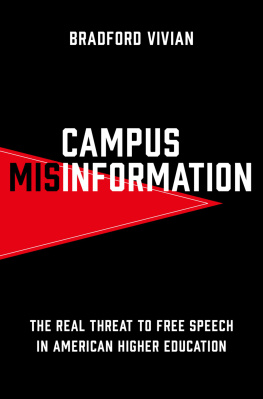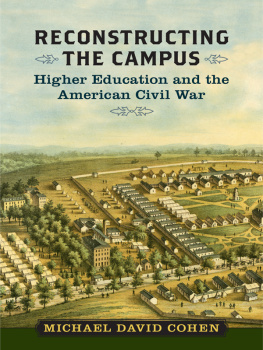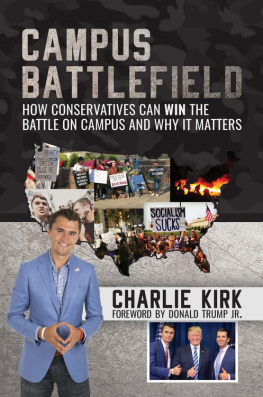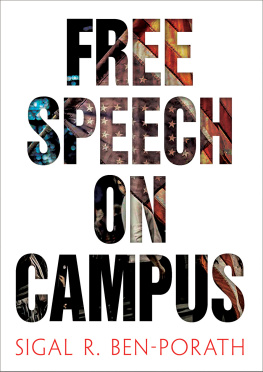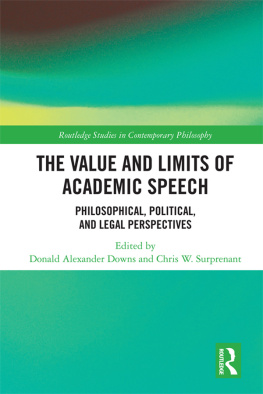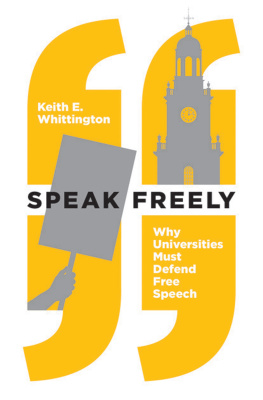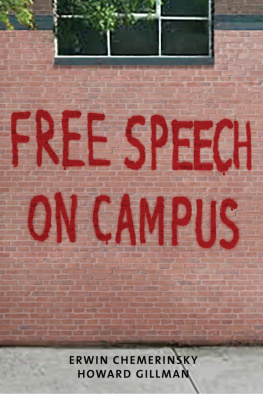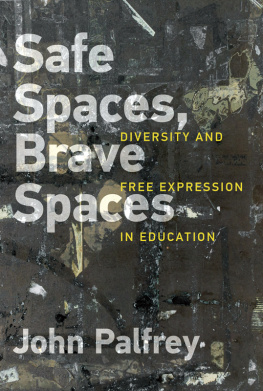Campus Misinformation

Oxford University Press is a department of the University of Oxford. It furthers the Universitys objective of excellence in research, scholarship, and education by publishing worldwide. Oxford is a registered trade mark of Oxford University Press in the UK and certain other countries.
Published in the United States of America by Oxford University Press
198 Madison Avenue, New York, NY 10016, United States of America.
Oxford University Press 2023
All rights reserved. No part of this publication may be reproduced, stored in a retrieval system, or transmitted, in any form or by any means, without the prior permission in writing of Oxford University Press, or as expressly permitted by law, by license, or under terms agreed with the appropriate reproduction rights organization. Inquiries concerning reproduction outside the scope of the above should be sent to the Rights Department, Oxford University Press, at the address above.
You must not circulate this work in any other form and you must impose this same condition on any acquirer.
Library of Congress Control Number: 2022941524
ISBN 9780197531273
eISBN 9780197531297
DOI: 10.1093/oso/9780197531273.001.0001
For all my studentspast, present, and future.
socrates: Then let me raise another question; there is such a thing as having learned?
gorgias: Yes.
socrates: And there is also having believed?
gorgias: Yes.
socrates: And is the having learned the same as having believed, and are learning and belief the same things?
gorgias: In my judgment, Socrates, they are not the same.
Plato, Gorgias (c. 380 BC)
The great truth was proclaimed by an ancient, that there is no royal road to learning.... The teacher who professes to possess a steam-rate conveyance for instruction, not only deceives himself, but will assuredly find his own errors produce a corresponding ill effect upon the improvement of his pupils.
J. Tourrier, A Treatise on Jacotots Method of Universal Instruction (1852)
Contents
The Department of Communication Arts and Sciences at Pennsylvania State University supported this book in a variety of ways. I benefited from the diligent work of my graduate student research assistants: Breanna Mapston, Caroline Koons, and Dominic Manthey. I am grateful for their assistance. Any errors in what follows, however, are mine alone.
I am also indebted to several of my departmental colleagues. Jim Dillard, LJ Shen, and Michael Steudeman shared their combined expertise with me about various aspects of social science and higher education. Mary Stuckey provided sage advice in early stages about conceptualizing this book and finding the right audience for it. Rachel Smith generously reviewed early drafts of and offered extensive consultation about the kind of scientific research that it examines. I am fortunate to have such supportive colleagues.
The subject matter of this book concerns several intersections between the state of higher education and that of democracy. My ideas and arguments about this subject matter were aided, indirectly but no less meaningfully, by the supportive institutional environment in which I worked throughout my research and writing. Two simultaneous service roles (as director of undergraduate studies in my home department and as director of the Center for Democratic Deliberation in the McCourtney Institute for Democracy at Penn State) enriched my understanding of the reciprocal relationships between healthy education and healthy democracy. Defending one is a way of defending the other.
Meredith Keffer at Oxford University Press generously supported my development of this book, with wise editorial guidance, into what I hope readers will find to be a constructive contribution to vital public as well as academic matters. I am grateful for her insights, and for the work of those at OUP who helped prepare it for publication.
I am also thankful, as ever, for my wife Annes extensive supportincluding her enthusiasm for the very idea of this book before I had put a single word on paper, and for her encouragement at every stage until I completed it.
I dedicate this book to all my students, regardless of their individual beliefs, opinions, or personal backgrounds. The opportunity to help them on their way in learning and in life has been, and will continue to be, a privilege.
Casual references to whats happening on college campuses are now common in public debates about a wide variety of perceived social and political ills. I started to encounter this phrase, here and there, in the mid-2010s. I overheard it in casual conversation and noticed it in news stories. The question of whats happening on college campuses became prominent during and soon after the presidential election of 2016. Students and colleagues at the university where I work talked about meeting people who presumed that awful things were transpiring on college campuses across the nation. This colloquialism crept into discussions about the state of politics and the fabric of society. The phrase was always uttered with a sense of foreboding, even dread. It suggested the revelation of a dark and troubling secret. Can you believe whats happening on college campuses? Seemingly anyone who used the phrase did so in hushed tones, as if relating a shadowy conspiracy.
I am a professor in one of the United States largest university systems. I have taught as a university instructor, at one professional rank or another, for more than a quarter of a century. I have taught hundreds and hundreds of students at four different institutions. Two of those institutions were private schools; the other two were public land-grant universities. I have taught students at institutions in southern, northern, and mid-Atlantic states. I have also interacted with undergraduate students at these institutions outside of the classroom, on committees and in service roles dealing with student affairs. And I had no idea what people were talking about when they started, not long ago, to angrily condemn whats happening on college campuses. Ominous stories about universities kept appearing that bore little resemblance to the places where I worked, the students whom I taught, or the colleagues with whom I worked.
What was allegedly happening on those campuses? Why did so many people who neither work nor study at universities become so troubled and enraged about so-called campus culture? For most of the past decade, a spectrum of pundits, politicians, and even some university faculty have popularized specious and exaggerated claims about college campuses. Promoting misleading claims about higher education has become a cynical but fashionable way to project intellectual superiority and attract public followings.
Many readers of this book will probably accept the following distortions, for example, as obvious truisms: Undergraduate students today are badly coddled. The smallest obstacles and disagreements trigger them. Students desire safe spaces and constant reassurance. The overly emotional whims of undergraduate students now run the show at colleges and universities. Most students, not just a few of them, think and act in such frenzied and domineering ways. The culture of most college campuses now represses free speech, diverse viewpoints, and constructive disagreement. That culture threatens not only higher education but democracy writ large.

